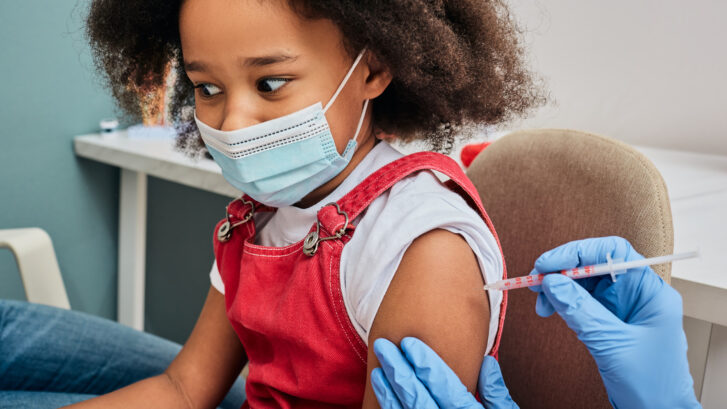Parents’ Guide to COVID-19 Vaccines for Kids
COVID-19 vaccines have been approved for kids between the ages of five and 11. Our concierge primary care doctors at MD 2.0 in Jupiter have been getting a lot of questions from concerned parents. Is it safe for my kids? Do they really need it? What about side effects?
We’re concerned because the most recent surveys show that only 27 percent of parents—many of whom have been vaccinated themselves—say they will vaccinate their children right away. Thirty-three percent say they will “wait and see” how the COVID-19 vaccines work for kids. Another 30 percent say they won’t let their kids receive a vaccine at all.
So here are some answers to the questions that might be worrying you as the government rolls out the COVID-19 vaccines for younger children.
Why kids need it
There are several very good reasons to vaccinate children against the coronavirus.
1. Over 700 children and adolescents have died of COVID-19 to date. This makes it one of the country’s top 10 leading causes of childhood deaths. Many others who haven’t died have become seriously ill from multisymptom inflammatory syndrome in children (MIS-C). It can cause inflammation of the heart, lungs, brain, kidneys, and eyes.
2. Children become infected and transmit the virus as easily as adults, even though half of them don’t show symptoms.
3. Those who experience mild or asymptomatic cases are still at risk of developing long-term debilitating effects. These “long COVID” symptoms include fatigue, brain fog, and difficulty breathing.
4. With so few schools offering a remote learning option this year, if kids become infected they can miss even more schooling than they did last year. If they’re fully vaccinated and don’t show symptoms, they won’t have to quarantine.
5. Unvaccinated kids who live in homes with vulnerable, immunocompromised adults can pass the virus on to them.
6. Every time someone becomes infected with the coronavirus—child or adult—they give the virus another opportunity to mutate. At some point, a variant may arise that the vaccines won’t protect us from. Then, we’ll be back to square one.
The safety question
It’s not surprising that people who were willing to take one of the coronavirus vaccines are more reluctant to allow their children to do so.
“I’m not sure,” Jennifer Spaetti of Salisbury, North Carolina, told ABC News. She and her husband Michael were both vaccinated last spring, as soon as the shots became available. But as primary caregivers for their six-year-old grandson, they wonder about long-term side effects.
“It just seems like it came out so fast,” she said. “And we’re talking about a child. I feel like it’s different for me, but I’m just not sure. I don’t think I know enough about it.”
First, the vaccine’s safety and efficacy was studied in 3,100 five to 11 year-olds who received the shot with no serious side effects.
Second, experts say any serious side effects that might occur would normally appear within two months of the inoculation. This was the duration of the clinical trials performed by Pfizer and reviewed by the U.S. Food and Drug Administration (FDA) and the Centers for Disease Control and Prevention (CDC).
Finally, the CDC’s 14-member panel unanimously recommended approval. One member said was a signal that all the members were “enthusiastic” about the vaccine for kids.
Dangerous side effects?
Most kids will have the same side effects as the adults who received one of the COVID-19 vaccines. Some will have no side effects at all. Others may experience 24-48 hours of a mild fever, soreness at the injection site, and so forth. The Pfizer vaccine for kids contains one-third the amount in the teen and adult version.
But what parents are thinking of when they ask us about possible side effects are more serious, long-term effects, especially those they’ve heard about through the rumor mill, including social media.
One very small risk is that of inflammation of the heart muscle, known as myocarditis. As of October 20, there have been nearly 1,700 reports of myocarditis that may be linked to the coronavirus vaccine, primarily in men younger than 30 and adolescent boys. Symptoms include shortness of breath, heart palpitations, and chest pain, but typically resolve quickly.
But myocarditis is also a risk with COVID-19, especially for children who develop MIS-C.
Rumors, not fact
One survey found that 66 percent of parents worried about the possibility of an impact on puberty or of future infertility in their youngsters.
“Unfounded claims linking COVID-19 vaccines to infertility have been scientifically disproven,” the American Academy of Pediatrics (AAP) says in a statement.
“There is no evidence that the vaccine can lead to loss of fertility,” it says. “While fertility was not specifically studied in the clinical trials of the vaccine, no loss of fertility has been reported among trial participants or among the millions who have received the vaccines since their authorization, and no signs of infertility appeared in animal studies. Similarly, there is no evidence that the COVID-19 vaccine affects puberty.”
That’s because there is no mechanism in the vaccine for something like this to happen. The vaccines create a false image of the real virus in the body. This teaches the body to recognize the real thing and prompting it to mount an immune response. They never enter the nucleus of any human cell to cause an effect like this, nor can it be incorporated into the person’s DNA.
If you have any questions about whether to vaccinate your young children, please let us know. Especially as we head into the holiday season, with more travel and family gatherings, it’s important that as many of us as possible be vaccinated.

